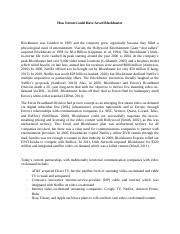The rise and fall of Blockbuster is a cautionary tale of how a dominant market player can fail to adapt to changing technology and consumer behavior. Blockbuster, once the leading video rental chain in the world, filed for bankruptcy in 2010 and closed hundreds of stores. However, what if Blockbuster had leveraged technology to its advantage? Here are 7 ways Blockbuster's tech could have saved the company:
Embracing Online Rentals

One of the most significant mistakes Blockbuster made was ignoring the rise of online rentals. While Netflix was gaining popularity, Blockbuster had the opportunity to create its own online rental platform. By embracing online rentals, Blockbuster could have expanded its customer base and reduced costs associated with maintaining physical stores.
Key Benefits:
- Increased convenience for customers
- Reduced costs associated with maintaining physical stores
- Ability to offer a wider selection of movies and TV shows
Implementing a Streaming Service

In addition to online rentals, Blockbuster could have launched a streaming service to compete with Netflix and other streaming giants. By offering a streaming service, Blockbuster could have attracted a new generation of customers who prefer to watch content online.
Key Benefits:
- Ability to offer a wide selection of content, including new releases and classic movies
- Convenience for customers who prefer to watch content online
- Opportunity to generate revenue through subscription-based models
Enhancing the In-Store Experience

While Blockbuster's physical stores were a major asset, the company could have done more to enhance the in-store experience. By leveraging technology, Blockbuster could have created a more engaging and interactive experience for customers, including self-service kiosks, digital signage, and loyalty programs.
Key Benefits:
- Improved customer experience
- Increased efficiency and reduced labor costs
- Opportunity to promote new releases and special offers
Developing a Mobile App

In today's mobile-first world, a mobile app is a must-have for any retail business. Blockbuster could have developed a mobile app to allow customers to browse and rent movies, access special offers, and manage their accounts on-the-go.
Key Benefits:
- Convenience for customers who prefer to use their mobile devices
- Opportunity to promote new releases and special offers
- Ability to collect customer data and improve marketing efforts
Using Data Analytics

By leveraging data analytics, Blockbuster could have gained valuable insights into customer behavior and preferences. This data could have been used to improve marketing efforts, optimize inventory, and enhance the overall customer experience.
Key Benefits:
- Improved customer insights and personalization
- Optimized inventory and reduced waste
- Enhanced marketing efforts and improved ROI
Creating a Social Media Presence

In today's digital age, a social media presence is essential for any business. Blockbuster could have created a social media presence to engage with customers, promote new releases, and build brand awareness.
Key Benefits:
- Improved brand awareness and reputation
- Opportunity to engage with customers and build loyalty
- Ability to promote new releases and special offers
Partnering with Other Companies

Finally, Blockbuster could have partnered with other companies to expand its offerings and reach new customers. For example, Blockbuster could have partnered with a streaming service to offer a bundled package or with a movie studio to offer exclusive content.
Key Benefits:
- Opportunity to expand offerings and reach new customers
- Ability to offer exclusive content and promotions
- Potential to generate new revenue streams






In conclusion, Blockbuster's failure to adapt to changing technology and consumer behavior ultimately led to its demise. However, by leveraging technology, Blockbuster could have enhanced the customer experience, expanded its offerings, and generated new revenue streams. As we look to the future, it's clear that technology will continue to play a critical role in shaping the retail landscape.
What could Blockbuster have done to stay competitive?
+Blockbuster could have adapted to changing technology and consumer behavior by embracing online rentals, implementing a streaming service, enhancing the in-store experience, developing a mobile app, using data analytics, creating a social media presence, and partnering with other companies.
Why did Blockbuster fail to adapt to changing technology?
+Blockbuster failed to adapt to changing technology due to a combination of factors, including a lack of vision, inadequate investment in technology, and a failure to respond to changing consumer behavior.
What can other companies learn from Blockbuster's mistakes?
+Other companies can learn from Blockbuster's mistakes by recognizing the importance of adapting to changing technology and consumer behavior, investing in innovation, and being willing to disrupt their own business models to stay competitive.
